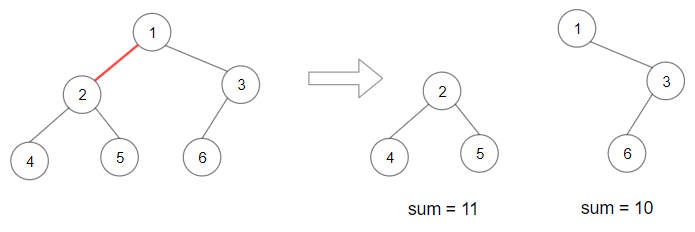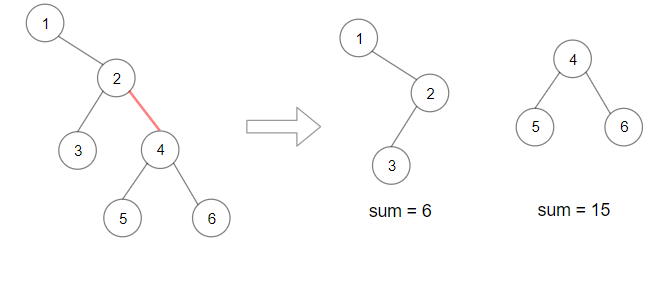LeetCode 1339. Maximum Product of Splitted Binary Tree
Given a binary tree root. Split the binary tree into two subtrees by removing 1 edge such that the product of the sums of the subtrees are maximized.
Since the answer may be too large, return it modulo 10^9 + 7.
Example 1:

Input: root = [1,2,3,4,5,6]
Output: 110
Explanation: Remove the red edge and get 2 binary trees with sum 11 and 10. Their product is 110 (11*10)
Example 2:

Input: root = [1,null,2,3,4,null,null,5,6]
Output: 90
Explanation: Remove the red edge and get 2 binary trees with sum 15 and 6.Their product is 90 (15*6)
Example 3:
Input: root = [2,3,9,10,7,8,6,5,4,11,1]
Output: 1025
Example 4:
Input: root = [1,1]
Output: 1
Constraints:
Each tree has at most 50000 nodes and at least 2 nodes.
Each node's value is between [1, 10000].
实现思路:
拆分二叉树,使得两棵树的结点权值和的乘积最大,回溯法。
AC代码:
class Solution {
long long maxN=0;
const long long N=1e9+7;
unordered_map<TreeNode*,int> mp;
public:
//计算树的总的权值和
void getALL(TreeNode *root,int &sum) {
if(!root) return;
sum+=(root->val);
getALL(root->left,sum);
getALL(root->right,sum);
}
//采用回溯法大大提升了效率
int dfs(TreeNode *root,int all) {
if(root==NULL) return 0;
int l= dfs(root->left,all);
int r=dfs(root->right,all);
int key=l+r+root->val;
if((long long)key*(all-key)>maxN) maxN=(long long)key*(all-key);
return key;
}
int maxProduct(TreeNode* root) {
int sum=0;
getALL(root,sum);
dfs(root,sum);
return maxN%N;
}
};
下面给出超时的写法
超时的写法
void dfs(TreeNode *root,int all) {
if(root==NULL) return;
dfs(root->left,all);
dfs(root->right,all);
int key=0;
getALL(root,key);
if((long long)key*(all-key)>maxN) maxN=(long long)key*(all-key);
}
采用上面这种方法的话,会每次递归都计算一次当前结点作为根结点的树的权值和,等于递归套递归大大增加了时间复杂度。



 浙公网安备 33010602011771号
浙公网安备 33010602011771号